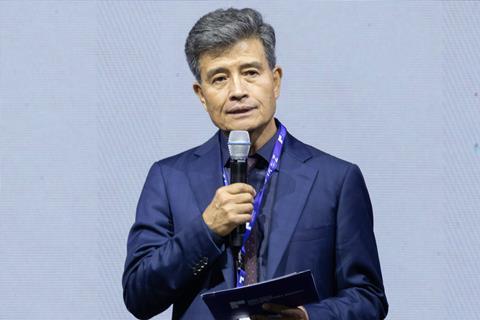
South Korea’s DMZ International Documentary Film Festival (DMZ Docs) is marking its 15th year with some major changes, including an overhauled programme structure and a new festival director, former professor and documentarian Chang Hae Rang.
“After I became festival director, I asked myself, ‘What is documentary and what should the DMZ International Documentary Film Festival be in this depressing world with tears and suffering everywhere?,” says Chang, whose credits include 2013 feature Moon Glow.
“I call it the ‘era of documentary’ because documentary records and observes in a truthful manner, which are essential to solve the problems around the world.”
The festival runs September 14-21 in and around Goyang City, near the demilitarized zone between North and South Korea, in Gyeonggi Province, while the industry event DMZ Docs Documentary Market takes place alongside the festival from September 15-19.
Opening the festival is Maite Alberdi’s The Eternal Memory, which features the story of Chilean journalist Augusto Góngora, who covered the country’s 1970s democracy movement and is now fighting Alzheimer’s disease. Góngora’s wife Paulina Urrutia, who also features in the film, will be one of the festival’s top guests.
“This film asks the audiences about history, memory, and human beings,” says Chang. The festival director also highlight non-competition feature In Viaggio, which tracks Pope Francis over nine years as he makes 37 trips to 53 countries.
“The documentary sheds light on the leadership of a Pope devoted to the poorest and weakest people, and awakens audiences to realities at the same time.”
The festival’s selection includes 148 films from 54 countries. Between the festival and market, around 100 guests are expected to attend, and the audience is anticipated to reach around 25,000, in line with last year. Films will be shown on 10 screens across two cinemas, CGV Goyang Baekseok and Megabox Baekseok Bella Citta. Non-screening events such as concerts and installations will take place on outdoor stages and at Camp Greaves, a former US military base.
Further notable guests include competition jury members Jean-Pierre Rehm, former festival director of FIDMarseille; award-winning French filmmaker Dominique Cabrera; and DocsBarcelona artistic director Anna Petrus.
Financially, the festival is supported by Gyeonggi Province, Goyang Special City, Paju City, KOFIC (Korean Film Council) and the Ministry of Culture, Sports, and Tourism.
Revamped competition
The festival’s competition sections have been reorganised into three categories: International, Korean and Frontier. Qualifying for these strands also has a higher bar this year: international competition films must be at least Asia premiere and Korea Competition films must be world premiere. Non-competitive sections have been reorganised into Verite, Docufiction, Essay and Expanded strands.
“These terms may sound unfamiliar to general audiences but we wanted to capture the documentary’s essence, such as pursuit of truth and fact, and experimentation of formats,” says Chang.
Awards include best feature in the International, Frontier and Korean strands, with cash prizes up to $15,000 (KRW20m). Further prizes include an Art Award, Solidarity Award and Newcomer of the Year award, each worth $7,500 (KRW10m).
Meanwhile, special exhibition categories include a section on the war in Ukraine, a retrospective on late Korean documentarist Lee Kang-hyun, a selection of films that feature journalism on film, and a look back at US documentary pioneer Robert J. Flaherty.
DMZ Docs launched in 2009 near the demilitarized zone between North and South Korea. This year marks the 70th anniversary of the armistice between the two countries.
Speaking about his ambitions as new DMZ Docs head, Chang says: “The DMZ is a line that not only divides North and South but also divides me and you, male and female, labour and management, disabled and nondisabled, rich and poor, liberal and conservative, human and nature, and everything standing at opposite sides. So, DMZ is the optimal place for observing and contemplating global issues.”
Another goal for Chang is to draw more young people to documentaries.
“This year, our film festival is making diverse attempts to overcome the limitations of legacy media and meet young generations as new audiences in the digital platform era,” he explains. “For example, we developed a (streaming) platform named VoDA and we are preparing various events in collaboration with YouTubers/creators.”
VoDA, short for Vision of Documentary Archive, launched in 2021 to provide access to the festival’s films during the Covid-19 pandemic but will be a permanent fixture moving forward.
Despite having “a long way to go and piles of problems to be solved,” Chang’s ultimate goal is for DMZ Docs to become “the best documentary film festival in Asia”.
“We strongly believe that it starts from sincerity,” he adds. “We will not turn away from global issues, and we will fight against them. We will also work with creators and will constantly arrange more opportunities where documentary films and audiences can share and interact with each other.”















![[L-R]: Amanda Villavieja, Laia Casanovas, Yasmina Praderas](https://d1nslcd7m2225b.cloudfront.net/Pictures/274x183/6/4/1/1471641_pxl_20251224_103354743_618426_crop.jpg)






![[L-R]: Amanda Villavieja, Laia Casanovas, Yasmina Praderas](https://d1nslcd7m2225b.cloudfront.net/Pictures/100x67/6/4/1/1471641_pxl_20251224_103354743_618426_crop.jpg)


No comments yet